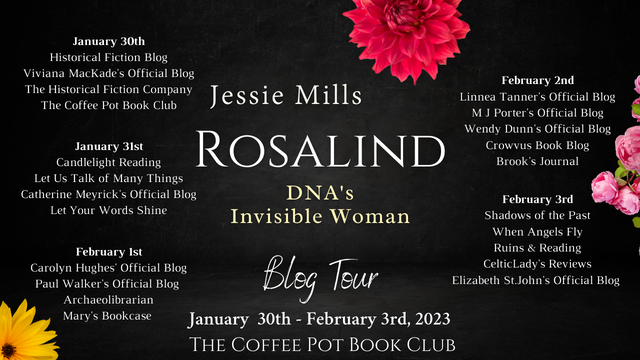
01 Feb ROSALIND: DNA’s Invisible Woman Jessie Mills #rosalindfranklin #historicalfiction #invisiblewomen #BlogTour #TheCoffeePotBookClub @byjessiemills @cathiedunn
FEATURED AUTHOR: JESSIE MILLS
Please welcome Jessie Mills as the featured author in The Coffee Pot Book Club Blog Tour being held between January 30th — February 3rd, 2023. Jessie Mills is the author of the Historical Fiction / Narrative Non-fiction, ROSALIND: DNA’s Invisible Woman, released by Ingram Spark/Alpha Helix Publishing on 15 March 2022 (print) and 18 February 2022 (digital) [310 pages].
Below are highlights of Rosalind: DNA’s Invisible Woman, author bio for Jessie Mills, and an excerpt from her book about Rosalind Franklin.
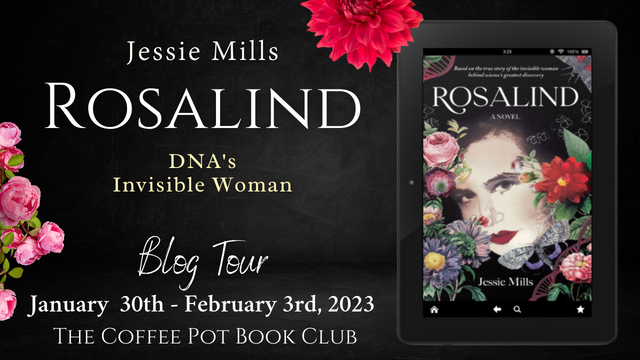
To follow the blog tour, CLICK Blog Tour Schedule
ROSALIND: DNA’S INVISIBLE WOMAN HIGHLIGHTS
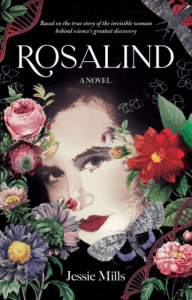
Rosalind: DNA’s Invisible Woman
by Jessie Mills
(blurb)
‘A luminous, pin-sharp portrait of a true trailblazer. Mills’s writing simply glows.’−Zoë Howe, Author, Artist and RLF Writing Fellow at Newnham College, University of Cambridge
Rosalind: DNA’s Invisible Woman tells the true story of the woman who discovered the structure of DNA, whose work was co-opted by three men who won a Nobel prize for the discovery.
Her story is one of hope, perseverance, love and betrayal.
Driven by her faith in science, Rosalind Franklin persisted with her education in the face of formidable obstacles, including the de-reservation of women from war science.
In Norway at the start of World War II, her place at Cambridge’s first women’s college was thrown into jeopardy. A decade later, she fled Paris upon the news that the research director at the State Chemicals Lab was having an affair. They continued to write to each other in secret.
Rosalind knew when embarking on science, a gentleman’s profession, that the odds would be stacked against a woman’s success. But she did not foresee that her pay would later be cut on account of her age and gender, that she would be burned by the plagiarism rife among her male contemporaries, or face her own battle with cancer.
When she took a research post at King’s College London, the head of the physics department switched her subject to DNA at the last minute.
She was tasked with discovering its structure using X-ray crystallography. Could she become the first scientist to map the DNA molecule and would the discovery ultimately be worth it?
When two researchers at Cambridge University, her alma mater, built a three-chain model of DNA weeks after seeing her lecture, she knew that it was wrong.
Scientists at each of the three labs competing in the race to find DNA’s structure had guessed that the molecule had three chains. Her evidence proved them wrong. But would anybody listen?
This is the story of DNA that you won’t find in the history books…
The woman behind science’s greatest discovery has been variously referred to as ‘an obsessive woman’, ‘difficult’, and ‘the dark lady of DNA’. Why was she called these names, and were they justified?
Written by journalist and former Wall Street Journal (PRO) editor Jessica Mills Davies, following nearly three years of intensive archival research, the novel aims to give Rosalind Franklin a voice for the first time in history. Her story is the most well-documented account of ‘the Matilda effect’ and its corollary ‘the Matthew Effect’, whereby women’s contributions to science and other professions are often ignored or misappropriated.
The Exeter Novel Prize-longlisted novel is peppered with copies of original correspondence between her and her contemporaries, illustrating how three men got away with the biggest heist in scientific history.
Buy Links:
Universal Link Amazon UK Amazon US Amazon CA Amazon AU
Barnes and Noble Waterstones Kobo Blackwell’s
AUTHOR BIO: JESSIE MILLS
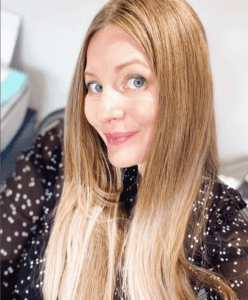
Jessica is a journalist and author. She has written for publications such as The Independent, The Wall Street Journal and Business Insider, where she investigated the use of flammable cladding in hospital intensive care units in 2020.
Before that, she was a member of the steering committee for Women at Dow Jones, where she spent several years as an editor and led the team that uncovered the misuse of funds at Abraaj.
Her debut novel tells the true story of Rosalind Franklin, the invisible woman behind the discovery of DNA’s double helix. It was longlisted for the Exeter Novel Prize 2020.
Social Media Links:
Website Twitter Facebook LinkedIn
Instagram Pinterest Amazon Author Page Goodreads
EXCERPT FROM ROSALIND: DNA’S INVISIBLE WOMAN
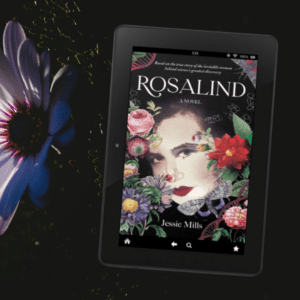
ROSALIND: DNA’s INVISIBLE WOMAN Part XI, chapter 35 (Ecclesiastes | Qōheleth’)
‘Are you pregnant?’ Dr Livingstone asks, taking one look at my stomach.
Her office is bare except for a leather chair. I had been struggling to zip up my skirt since New York. The diners there served fatty breakfasts, pancakes with a choice of maple syrup or jam, and cheese omelettes, in quadruple the usual quantity.
The doctor beckons for me to sit down as I hover at the entrance to her office. I pause. My hands are sweaty and my heart is pounding. She flicks through my notes, which are kept in a brown envelope, waiting for a response.
‘I wish that I was,’ I say, betraying my fears of spinsterhood.
It makes me nervous when doctors ask such personal questions. I didn’t know how many of my parents’ friends attended that same surgery in Hampstead. Even if I was pregnant, would I tell a person behind a desk? As the local doctor, she’s in a position of authority to elicit my most vulnerable secrets. What would she think of me, if I told her that I could be pregnant? Would she think I was a harlot?
‘Are you trying?’ the doctor asks, checking my notes once more.
‘I’m not married.’ The sound of my voice betrays my disappointment.
‘Professor Nixon is very good,’ she says, referring me to see a specialist.
‘What will you say on the referral?’
‘Patient notes are private Ms Franklin.’
‘Please don’t use the word pregnant. I don’t want people to talk.’
‘Do you think you might be?’
‘No, I mean, I came about stomach pains, not pregnancy.’
‘I think you had better leave, Ms Franklin. I’m referring you to see a specialist for your bloating and gastralgia. There’s not much more I can do for you unless there’s anything more you want to tell me.’
It is several weeks before I receive a letter with a date to see Professor Nixon. The gel specimens of the tobacco-mosaic virus are keeping me busy most nights. I need to find a way to reconstitute specimens of the virus and prepare them to be X-rayed. Before my trip abroad we had struggled to get good specimens, as the slides were sticky with RNA. By treating the build-up, we were able to get clearer X-rays.
On examining my stomach, the specialist Dr Nixon immediately advises surgery. He says University College Hospital will operate for free under the National Health Service, which is less than a decade old.
‘Is it really necessary?’ I ask.
‘We won’t know what’s causing your symptoms without investigating further.’
Before surgery, the nurse at the hospital hugs me and tells me not to worry. The next few minutes are a blur.
‘Have you had a surgery before?’ she says as she takes my blood pressure.
Her velvety accent sounds Caribbean.
‘The only serious illness I’ve ever had is jaundice, except for a cold now and then.’
‘When was that?’
‘I was twenty-two.’
‘You’ll be fine,’ she says. ‘Don’t you worry.’
She says it in the way that adults comfort children, with both benevolence and pity. In her palm, she is holding a small mountain of drugs.
‘Three painkillers, one penicillin. Take them.’
The doctor returns shortly afterwards with a form for me to sign.
‘It’s for consent,’ he says.
The form says that if one of my organs is damaged during the operation, the surgeon has permission to repair it.
‘How often does that happen?’ I ask him.
‘Rarely,’ he says.
Another box asks me to consent to my ovaries being removed if necessary. It says there is a chance of death from the operation.
‘This is only meant to be exploratory,’ I say.
The nurse puts her hand on mine and looks at the form with me.
‘They only do what’s needed,’ the doctor says.
He registers my details and explains the procedure. Then he hands me a pillow and sends me to wait outside in a cemented stairway. I feel as though I am holding my block for the gallows. I had signed my life away. Now I am waiting for the inevitable. My whole body, up to my shoulders, is trembling.
‘So you’re a physicist? What are you working on?’ the anaesthetist asks as I’m laying on my back in a hospital bed, upstairs from the registrar.
‘Polio,’ I say.
He asks me to lie down and count backwards from ten while he injects the drugs into my veins. As I count the numbers, the summer sunshine begins to fade away.
I have applied for a grant to fund my investigations into the structure of polio. It is the very last thing on my mind when the anaesthetic starts to take effect. If we could map the structure of the virus, as Dorothy Hodgkin had done with penicillin, it would be possible to make a synthetic vaccine. It hadn’t been done before. A denatured polio specimen was available, but an artificial vaccine would be cheaper. The more people who were immunised, the more effective any vaccine would be. Perhaps one day it would eradicate the most paralysing killer of the age: polio.
The next thing I know, I am being propped up on a hospital bed by two nursing staff.
‘Did they find anything?’ I ask.
Their silence is palpable. From the corner of my eye, I see the nurses turn to each other while they are adjusting the bedding underneath me. There is an almost equal chance of good or bad news, but their reticence is foreboding.
…

Instagram: @thecoffeepotbookclub


Cathie Dunn
Posted at 04:03h, 02 FebruaryThank you so much for hosting Jessie Mills today, Linnea! xx
Linnea Tanner
Posted at 21:56h, 06 FebruaryHi Cathie–It was a pleasure to host Jessie Mills’ novel, “Rosalind: DNA’s Invisible Woman.”
Jan Sikes
Posted at 09:57h, 03 FebruaryCongratulations to Jessie! Love the excerpt. Thanks for sharing, Linnea.
Linnea Tanner
Posted at 21:57h, 06 FebruaryHi Jan–Thank you for visiting and for your continued support of the authors highlighted on my website. Hope you have a fabulous week!
Luciana
Posted at 23:07h, 04 FebruarySounds like an interesting story. Good luck and congratulations on the book release, Jessie.
Linnea Tanner
Posted at 21:59h, 06 FebruaryHi Luciana–Thank you for visiting and commenting. The book also caught my attention because women scientists during this time period often did not get credit.